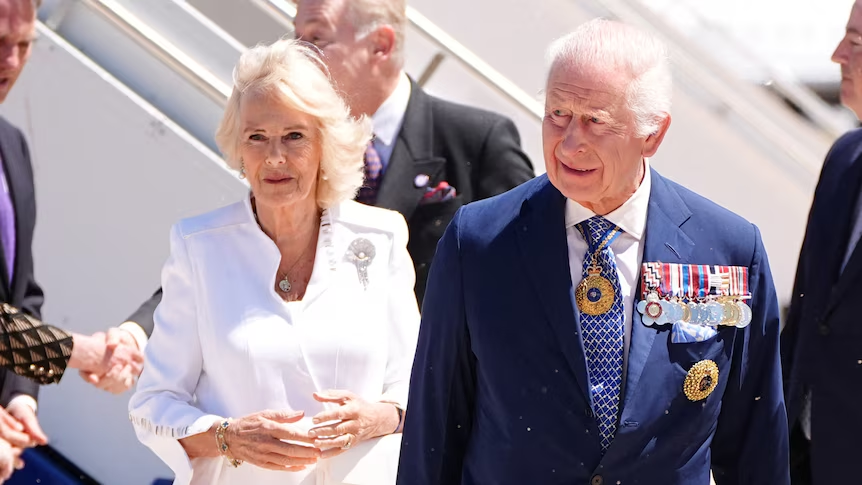Introduction: In a powerful and impassioned speech, King Charles has once again demonstrated his unwavering commitment to environmental advocacy. Addressing an international climate summit, the British monarch highlighted the urgent need for global unity to combat the escalating climate crisis. His stirring words resonated with leaders, environmentalists, and citizens alike, shedding light on a reality that affects every corner of the globe. This speech underscores not only his dedication to environmental causes but also his role as a global influencer in the fight against climate change.

The Core Message: Standing before a diverse audience of world leaders, scientists, and activists, King Charles delivered a speech that many are calling the most critical of his reign. He began by acknowledging the dire state of the planet, pointing to increasingly frequent natural disasters as undeniable evidence of a warming world. From record-breaking heatwaves to devastating floods, the monarch warned that these events are no longer isolated incidents but rather the “new normal” unless immediate action is taken.

“The time for inaction has long passed,” he declared. “We must come together, as nations and as individuals, to make transformative changes if we are to preserve this planet for future generations.”
Proposed Initiatives: King Charles outlined a comprehensive plan aimed at tackling the crisis on multiple fronts. His proposals included:
- Increased Funding for Renewable Energy Projects: He emphasized the necessity of transitioning from fossil fuels to renewable energy sources like wind, solar, and hydroelectric power.
- Implementation of Stricter Environmental Regulations: The King called for governments to adopt more robust policies to limit greenhouse gas emissions and protect biodiversity.
- Prioritizing Education on Sustainable Practices: Stressing the importance of long-term solutions, he advocated for integrating environmental education into school curricula worldwide.
- Corporate Responsibility: King Charles urged corporations to take a leading role in the transition to a green economy, suggesting incentives for businesses that adopt sustainable practices.
A Lifetime of Advocacy: King Charles’ commitment to environmental issues is not new. For decades, he has been a vocal advocate for sustainability, often using his platform to promote awareness and action. His initiatives, such as the Prince’s Trust and his organic farming endeavors at Highgrove Estate, reflect a deep-rooted passion for the environment.
Many have noted how his early warnings about climate change, once dismissed as alarmist, have proven prescient. His speech at the summit reinforced his reputation as a forward-thinking leader who understands the interconnectedness of environmental, economic, and social issues.

Public Reaction: The speech received widespread praise from various quarters. Environmentalists lauded the King for his bold and candid remarks, while social media platforms buzzed with hashtags like #RoyalClimateAction and #KingCharlesSpeech. Many users expressed gratitude for his leadership, with one tweet reading, “King Charles is the voice of reason we desperately need in these trying times.”
However, not all responses were positive. Critics questioned whether the King’s words would translate into tangible actions, especially from governments and corporations that often prioritize economic growth over environmental sustainability. Some skeptics also pointed to the Royal Family’s carbon footprint, arguing that leading by example is essential.
Scientific Perspective: Experts in climate science have echoed the urgency conveyed in King Charles’ speech. Dr. Eleanor Harris, a climate scientist and advisor to global organizations, commented:
“The King’s speech highlights the reality that we are at a tipping point. His call for unity and bold action is exactly what the world needs right now. However, turning rhetoric into action requires commitment from all sectors of society.”

The Role of the Royal Family: While the British monarchy traditionally refrains from political involvement, King Charles has consistently pushed the boundaries of this convention when it comes to environmental issues. His influence as a global figure allows him to raise awareness and rally support for critical causes. By addressing world leaders directly, he has positioned himself as a key player in the climate change discourse.
Challenges Ahead: Despite the positive reception of his speech, the road ahead is fraught with challenges. Achieving global cooperation on climate action has proven difficult, with varying priorities and economic constraints often hindering progress. Additionally, the rise of climate skepticism and misinformation poses significant obstacles.
King Charles’ speech serves as a rallying cry, but its impact depends largely on the willingness of governments, businesses, and individuals to embrace the necessary changes. The question remains: Will his words be the catalyst for a global movement, or will they fade into the background of ongoing debates?
Call to Action for Citizens: While the King’s speech focused on large-scale initiatives, he also emphasized the role of individuals in driving change. From reducing energy consumption to supporting sustainable businesses, every action counts. King Charles urged citizens to “vote with their wallets” by choosing eco-friendly products and holding corporations accountable for their environmental impact.
Global Momentum: In the days following the speech, several countries and organizations announced new commitments to combat climate change. France pledged to invest heavily in renewable energy, while a coalition of private companies unveiled plans to reduce their carbon footprints. These developments suggest that King Charles’ words have already begun to inspire action.
Conclusion: King Charles’ speech at the international climate summit marks a significant moment in the global fight against climate change. His call for unity and decisive action has resonated deeply, offering hope amid a challenging landscape. As the world grapples with the consequences of inaction, his words serve as both a warning and an inspiration.
The responsibility now lies with all of us—leaders, corporations, and citizens alike—to ensure that this pivotal moment becomes a turning point in our collective efforts to save the planet. The stakes have never been higher, but with determination and collaboration, a sustainable future is still within reach.

